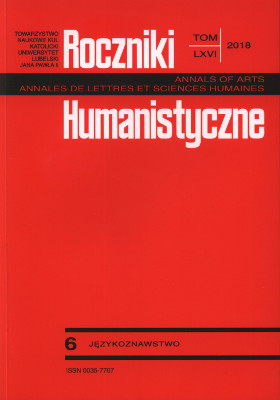Chronologiczne, socjologiczne i terytorialne zróżnicowanie słownictwa w ujęciu Zygmunta Glogera
Chronological, sociological and territorial differentiation of vocabulary according to Zygmunt Gloger
Author(s): Urszula SokólskaSubject(s): Language and Literature Studies, Theoretical Linguistics, Lexis, Semantics, Historical Linguistics
Published by: Towarzystwo Naukowe KUL & Katolicki Uniwersytet Lubelski Jana Pawła II
Keywords: Zygmunt Gloger; specialist vocabulary; semantic field; language awareness; linguistic awareness
Summary/Abstract: The paper analyzed lexis collected by the researcher and grouped according to the concept of the semantic field and definition constructions. Special attention was paid to Old Polish vocabulary, derived from German, concerning town organization (e.g. archiwum miejskie, koza, kram, ratusz, skarbiec, syndyk). Specialist, environmental and regional vocabulary was described: harvesters’ vocabulary (e.g. czeladka, gromadka, kłosować się, okrężne, postacianka, przepiórka), wedding vocabulary (e.g. drużba, dziewosłąb, korona, korowaj, poczęstne, wesółka), rafters’ and sailors’ vocabulary and fishermen’s vocabulary (e.g. binduga, drygawka, kłomla, lintuga, sternik, sztaba, tralówka, wicina, wiersza, wylewajka, żak), vocabulary associated with home and farm (e.g. dobytek, kamara, siedlisko, siestrzana, sernik) and with folk tradition (e.g. Sobótka, kucja, Kupała, środa gradowa, tryzna, wilja) and other (e.g. bibik, biel, brzechwa, gleja, grzebułka, oberżysta, stopniowanie, czyli dialekt przejściowy, stręczyciel).
Journal: Roczniki Humanistyczne
- Issue Year: 66/2018
- Issue No: 6
- Page Range: 177-195
- Page Count: 19
- Language: Polish

